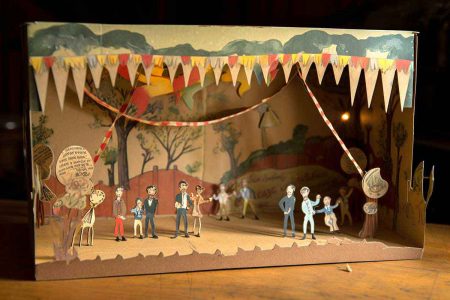 FOR PARENTS | FOR THEATRE GROUPS
FOR PARENTS | FOR THEATRE GROUPS
The arts have long been celebrated for their ability to inspire creativity, build confidence, and foster empathy in young minds, but with the rise of digital entertainment, the value of live theatre in child development is often overlooked, especially in exploring their own emotions and having a shared language for them with their parents.
Here is a comprehensive guide detailing how parents, theatre groups and other organisations can help your child to get the most out of their theatre experience.
FOR PARENTS
1. Exploring the Theatre Scene
The theatre world extends far beyond the grand stages of West End or Broadway productions. Your local theatre scene will be diverse, from small professional theatre groups like Spontaneous Productions in South London, to community plays, amateur theatrics and school productions. Attending local performances not only supports your community’s artistic endeavours but also exposes your child to a variety of theatrical styles and stories.
Many local theatre groups offer workshops tailored for children. These events can teach children about various aspects of theatre, such as acting, costume design, or stagecraft, and help them better appreciate the show. Enrolling your child in theatre workshops or classes can help them further explore their interests and develop new skills, whether it’s acting, singing, or dancing.
2. Pre-Show Preparation
A successful theatre experience starts long before the curtain rises. Here are some pre-show activities that can enhance your child’s development and enjoyment of their time out with you, and create an extended theatre experience for you both.
Show Discussion and Familiarisation
Invite your child to ask questions about the show or general theatre experience, and discuss how live theatre differs from television and cinema. Talk about the show’s storyline, characters, and themes. This primes your child’s mind for the show, and promotes critical thinking and a deeper understanding of the art.
Picture-Book Reading
 If it is a classic story, such as Aladdin, read a picture-book version together to introduce your child to the story and characters. When your child sees the scenes repeated from the book, they will experience the thrill of recognition, and can appreciate the plot more deeply. If the theatre show is then very different from the traditional version, that will give you something extra to discuss later.
If it is a classic story, such as Aladdin, read a picture-book version together to introduce your child to the story and characters. When your child sees the scenes repeated from the book, they will experience the thrill of recognition, and can appreciate the plot more deeply. If the theatre show is then very different from the traditional version, that will give you something extra to discuss later.
Meet the Cast
If the theatre offers it, arrange for your child to meet the cast before the show. This interaction can humanize the performers and make the experience more engaging for your little one. They will be excited to see their ‘favourite’ when they appear up on the stage.
Behind-the-Scenes Tours
If the theatre offers it, a behind-the-scenes tour can be an eye-opening experience, providing insight into the work that goes into producing a show. Plus, it can inspire curiosity and appreciation for the technical aspects of theatre.
3. During the show
Observing your child’s reactions
As the lights dim and the curtain rises, pay attention to your child’s reactions to the performance. Are they laughing, clapping, or expressing curiosity? These emotional responses are excellent indicators of their engagement and can provide valuable insights into the aspects of the performance that resonate with them. By being attuned to your child’s reactions, you can later tailor discussions and activities to reinforce the themes that captured their imagination.
Encouraging active engagement
While maintaining proper theatre etiquette, encourage your child to actively engage with the performance. This can be as simple as quietly whispering predictions about the story, or gently tapping their feet to the rhythm of the music. Active engagement helps your child to develop their analytical skills and better understand the story’s narrative, making the theatre experience more meaningful. If the show is an interactive one, encourage them to join in whole-heartedly. Join in with them!
Asking open-ended questions
During intermission or quieter moments, gently prompt your child with open-ended questions related to the performance. For example, ask them about their favourite character, or what they think will happen next; perhaps develop several possible and highly-improbable versions. These questions can stimulate their critical thinking and imagination, helping them process the story and its themes more deeply. Be mindful of your surroundings, of course, and keep conversations discreet so as not to disturb other audience members.
4. Post-show activities
Post-performance discussions
These allow your child to further explore the themes, emotions, and ideas presented on stage. Ask open-ended questions about their favorite moments, characters, or scenes and listen attentively to their responses. This not only helps them process and internalize the experience but also demonstrates the value you place on their opinions, boosting their self-esteem.
Connecting themes to everyday life
Theatre often presents valuable life lessons and relatable themes that can be connected to your child’s day-to-day experiences. Discuss how the story’s themes relate to their own lives, whether it’s the importance of friendship, overcoming challenges, or being true to oneself. Drawing these connections can help your child develop a deeper understanding of the world around them and foster empathy, resilience, and self-awareness.
Creating at-home theatrical experiences

- Create Your Own Play Encourage your child to create and stage their own play at home, inspired by the show they’ve seen. Transform your living room into a makeshift stage, complete with costumes, props, and a captive audience of family members, friends, pets or toys. If space is a challenge, create a miniature theatre out of a cardboard box and create cardboard characters.
- Dressing up Raid your wardrobes or dressing-up box to recreate the costumes and scenes they saw in the show or create vastly-improved ones.
- Post-Show Colouring-In Session Organize a colouring-in session featuring images related to the performance to help your child process their experience. Ask your theatre if they have any specially-created ones for the show.

Encouraging creativity and imagination
The theatre can spark your child’s creative instincts, so seize this opportunity to nurture their artistic side. Encourage them to draw scenes or characters from the performance, or write their own stories or plays. By participating in these at-home productions, your child can experience the joy of storytelling and self-expression while developing their creative and social skills. This can help them process their experience, express their thoughts and feelings, and further explore the themes and characters they’ve encountered.
FOR THEATRE GROUPS
Theatre groups can extend the theatrical experience for children by organizing various events, workshops and creative materials either directly or via partner groups:
- Workshops and Classes: Offer theatre workshops or classes to help children further explore their interests and develop new skills.
- Art Workshops: Organize art workshops for children to create their own art inspired by the show. This hands-on activity can foster creativity and self-expression, while also helping children connect with the performance on a deeper level.
- Reading Sessions: Hosting reading sessions featuring the story from an upcoming show can help the little ones understand the show better when they visit the theatre, especially if it is a more complex story.
- Picture-books and activity books: Theatre groups can create picture-books, activity books and colouring pages based specifically on their show’s characters and costumes, to reinforce the child’s understanding and memory of what they watched. These books may include puzzles, mazes, and games that are inspired by the production, helping children to think critically and have fun with the show’s themes and characters.
- Q&A Sessions: Host Q&A sessions with the cast and crew following the show to deepen children’s understanding of the performance.
- Parent-Child Theatre Workshops: Organize parent-child theatre workshops to provide a bonding experience while introducing both generations to the world of theatre. These workshops can cover various aspects of theatre, such as scriptwriting, acting, or stage design, fostering collaboration and shared learning.
- Relaxed Performances: Host ‘relaxed performances’ that are tailored to accommodate children with sensory sensitivities or special needs.
- Art Exhibits: Organize art exhibits related to the show’s theme or production elements, giving children an opportunity to explore visual arts and gain a broader understanding of the performance.
- Immersive Theatre: Experiment with immersive theatre experiences where children become active participants in the story. This interactive approach can create a more memorable experience and help children better understand the story and characters by putting them in the middle of the action.
- Outdoor Performances: Hold outdoor performances to create a unique and engaging environment for children. The change of scenery can help capture their attention and make the performance more memorable.
- Technology Integration: AR, VR, and AI: Theatres can incorporate [augmented reality (AR) or virtual reality (VR)] experiences to offer a fresh, innovative way for children to explore the world of the show. These cutting-edge technologies can make performances more immersive and interactive, engaging children on a deeper level.
- Volunteer Opportunities: Theatre groups can offer volunteer opportunities for families, allowing children to become more involved in the production process and understand the value of teamwork and community service.
- Accessibility: Ensuring that performances are accessible to children from diverse backgrounds, including those with disabilities, is essential for promoting inclusivity and equal opportunities for all.



